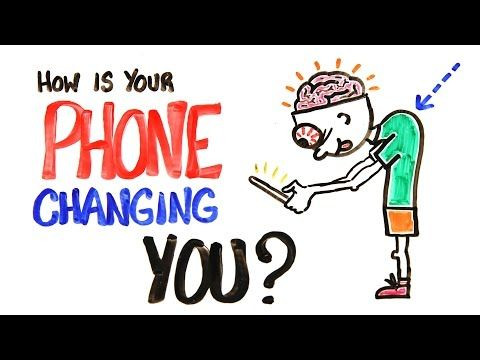High Cell Phone Usage Alters Body Posture, Brain Function

Most of us are attached to our smartphones at the hip — literally. In the digital age, roughly six out of seven billion of us own a mobile device, using it to talk, text, email, and even stream episodes of our favorite shows. This all seems to be harmless, habitual and automatic behavior that we hardly notice, but the popular gadget is doing a lot more to the mind and body than we think.
In AsapSCIENCE's latest video, “How Is Your Phone Changing You?” host Mitchell Moffit explains high usage of smartphones can change our body posture and brain function. When we look down at our phone, our spine angle is equivalent to that of an 8-year-old child sitting on our neck, according to AsapSCIENCE. This is fairly significant considering we spend an average of 4.7 hours a day looking at our phones.
Unsurprisingly, cellphones have changed our eyesight — for the worse. Staring at our phones and sitting in front of the computer has led to an increase in the prevalence of myopia, or nearsightedness, in North Americans. In the 1970s, about one-fourth of the population had myopia, while today nearly half do, and in some parts of Asia, 80 to 90 percent of the population is now nearsighted.
It can be hard to put our phones down because they tend to deliver bursts of dopamine — a neurotransmitter that affects our emotions, movement, and sensations of pleasure and pain. We achieve small goals when we play the game Candy Crush, for example. These achievements reward our brains with little bursts of dopamine. When we're rewarded with new content on the game, it creates a compulsion loop that has us coming back for more — this is the same loop that's responsible for the behaviors associated with nicotine or cocaine addiction.
As a result, 93 percent of young people aged 18 to 29 report using their smartphones as a tool to avoid boredom, as opposed to doing so by reading books or spending time with friends. Others rely on their smartphones to appear busy or occupied so that they can avoid awkward social situations where they feel out of place. There’s even a term now to define the fear or anxiety of being without your phone — nomophobia.
Heavy cellphone use can also alter our brain function. Alpha rhythms are commonly associated with “wakeful relaxation” like when our mind wanders off, whereas gamma waves are associated with conscious attentiveness. Experiments have shown that when a cell phone transmits signals, like during a phone call, the power of these alpha waves significantly rises. This means phone transmissions can literally change the way our brains work.
Lastly, our phones can disrupt our sleep cycles, which could explain why so many of us have insomnia. The screen emits a blue light, which has been known to alter our circadian rhythms, diminishing the time we spend in deep sleep, and increasing our risk for diabetes, cancer, and obesity. Studies show people who read on their smartphone at night have a harder time falling asleep, and produce less melatonin, a hormone responsible for the regulation of the sleep-wake cycle. The Harvard Medical School advises that we all avoid technology in the two to three hours leading up to bedtime in order to have better sleep.
Perhaps disconnecting from our smartphones can add to our longevity and overall health.
Published by Medicaldaily.com



























